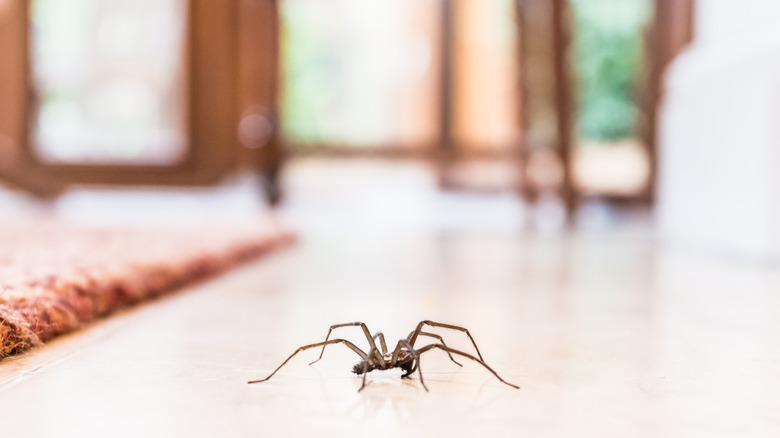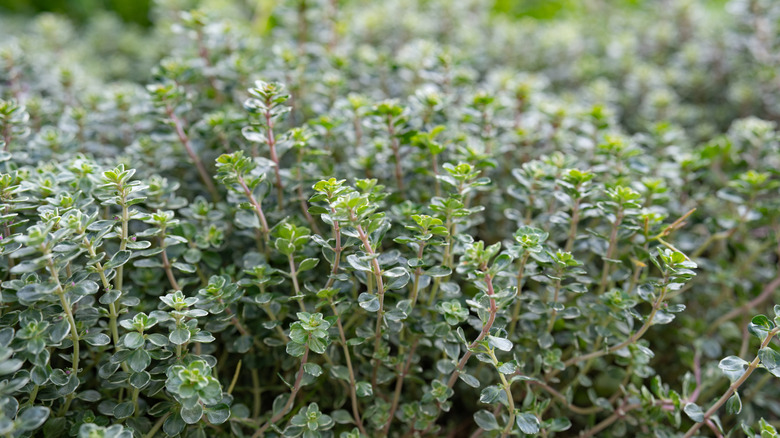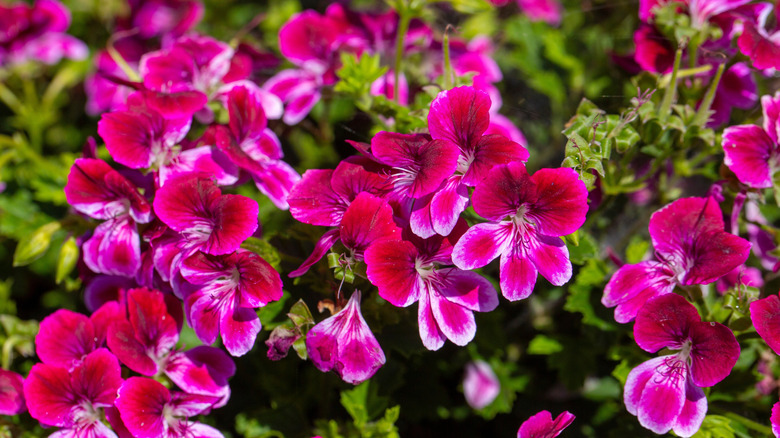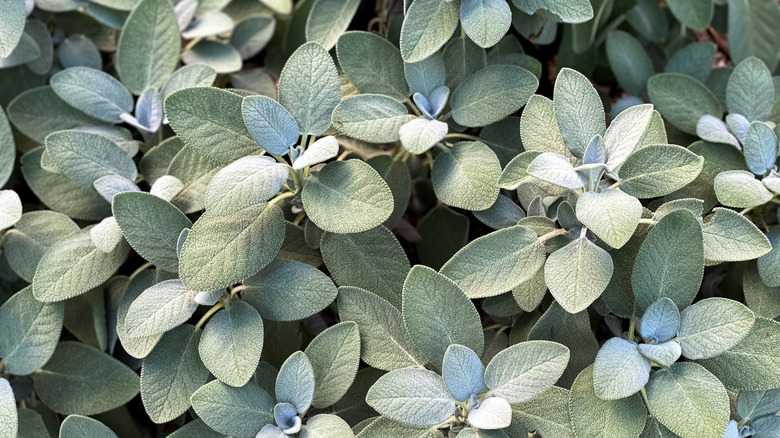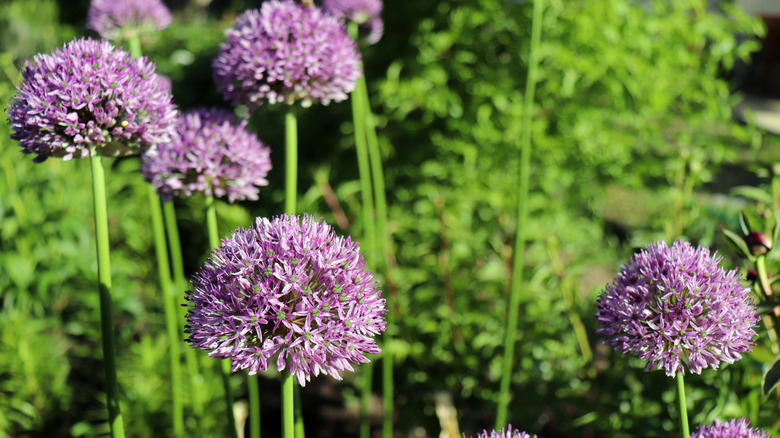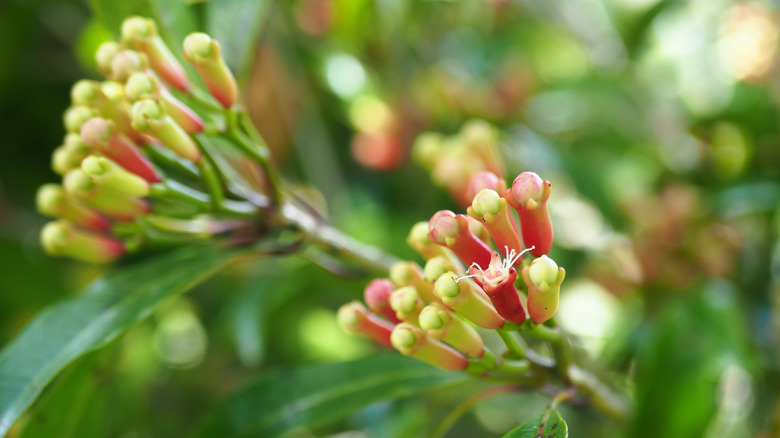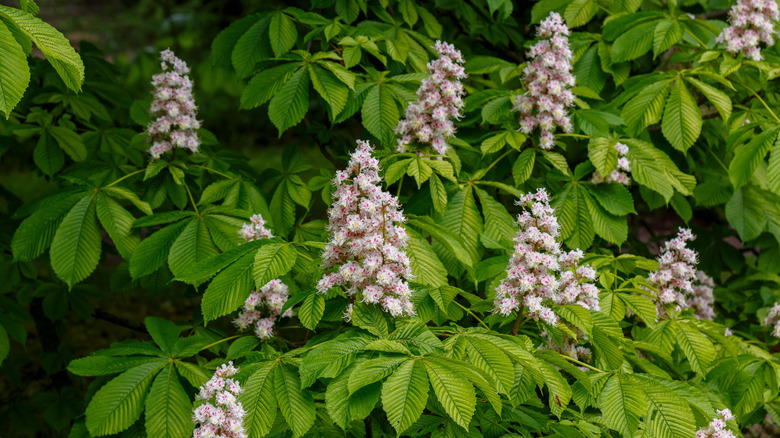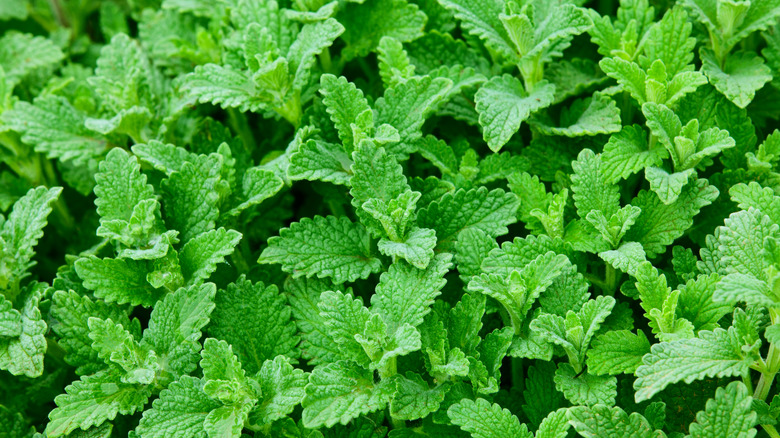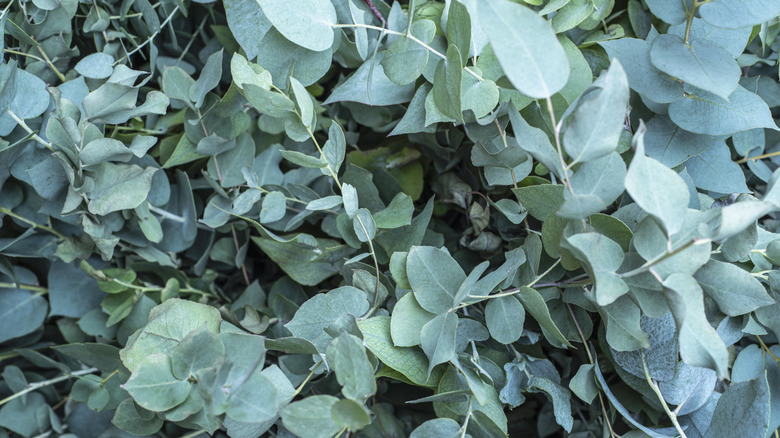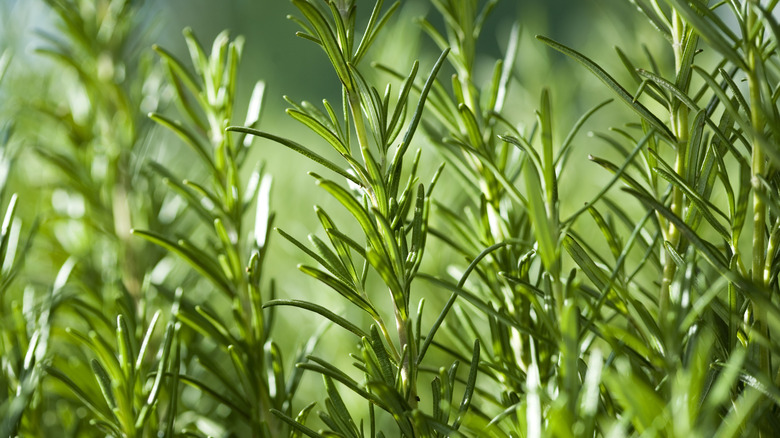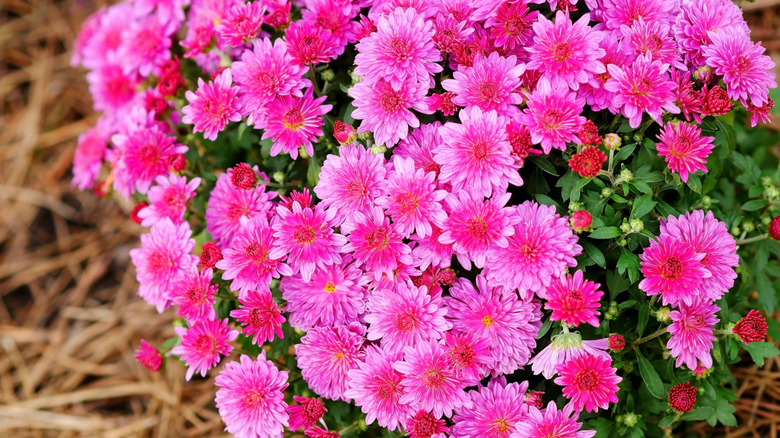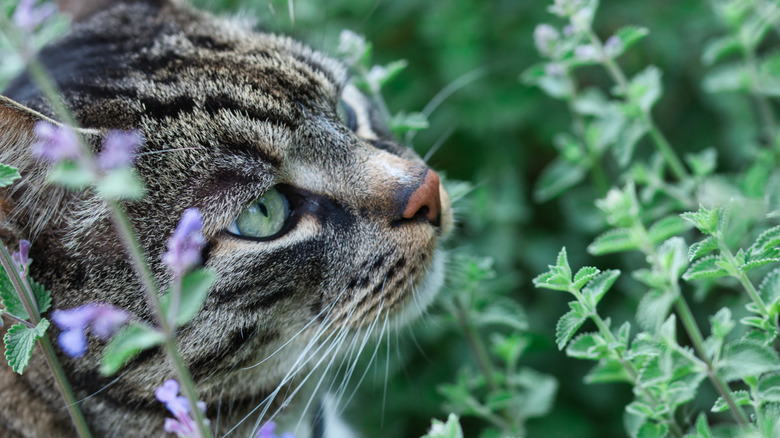Grow These 11 Plants To Help Keep Spiders Far Away From Your Home
Do you ever wonder why spiders seem to have a knack for finding their way into our homes? It's like they have a homing beacon set directly for our cozy living spaces. Spiders are drawn to our homes for several reasons, including the promise of abundant prey like flies and other insects, comfortable hiding spots, and suitable nesting environments. Essentially, they enter our homes because of survival instincts. The good news is that there are methods you can utilize to keep them out. Common practices for keeping spiders out range from keeping a tidy and clutter-free home to sealing up cracks and gaps in doors and windows.
However, you can do all of that and still find these creepy crawlers entering your house. But here's an interesting twist: some plants may actually help keep them away. So what are the best plants to repel spiders? While there are a handful of options to experiment with — from catnip to sage – keep in mind these are not a cure-all fix. If you have issues with spiders, adding these plants to your yard or in potted plants near entry points can help deter them, but only if you combine them with other spider-repelling solutions. The plants also need to be consistently rustled or their leaves crushed to release the essential oils that repel the arachnids, so it's also not a set-it-and-forget-it solution. But if you want to embrace green pest control and are looking to plant some landscaping that can work double-duty, here are 11 plants known to have spider-repelling properties.
Grow thyme for its aromatic oils that pests hate
Although thyme is best known as a flavorful kitchen herb, it also works surprisingly well as a natural spider repellent. The most well-known variety, common thyme (Thymus vulgaris), contains pest-repelling compounds, including thymol and linalool, which are both EPA-registered pesticides. These fragrant properties can disrupt the nervous systems of pests, which is likely what keeps spiders from wanting to stick around. According to the New York State Integrated Pest Management program at Cornell University, thyme and thyme oil aren't just effective against spiders, but also ants, fleas, ticks, and even common garden pests, like aphids.
You can grow thyme indoors or outside to help prevent spiders and insects from sneaking into your home. Try placing potted thyme near windows, doorways, or other entry points where pests might get in. It's perfect for adding to indoor herb gardens, where it'll emit a spider-repelling aroma while being nearby when cooking. When growing outside, it makes a beautiful, flowering groundcover that fills the yard with its earthy fragrance. One mistake gardeners commonly make when growing thyme is not giving the plant enough sunlight, especially when growing it inside the home. In addition to preferring full sun, thyme grows best when planted in well-drained, sandy or rocky soils that have a neutral to alkaline pH.
Use scented geraniums in your landscape to keep arachnids out
Scented geraniums (Pelargonium) aren't just perfect additions for a stunning flower garden; these stunning flowers can deter spiders from your living spaces. The active compound in geraniums, geraniol, is a fragrant terpenoid that's often used in pesticides against pests like spiders, ticks, and mites. Because this property interferes with the sensory organs in insects and arachnids, it makes it more difficult for them to find food and detect threats. If they can't smell properly, they're more likely to leave. Geraniums also contain linalool, another compound that's famous for its fragrance and ability to keep pests at bay. While these compounds tend to be more potent and effective in an essential oil format rather than plant form, the rather strong aroma of the flowers and leaves may be enough to make spiders turn the other way.
Although the blooms emit a pleasant scent, they're more well-known for the fragrance their foliage releases when the leaves are touched. To make the most of their spider-repelling power, plant them somewhere with easy access so you can give the leaves a little squeeze and release that potent fragrance. They grow well in beds or containers, so you can grow them nearly anywhere you've noticed spider activity. Add them to hanging baskets on the front porch, in pots to place around the home, or in a sunny garden bed. There are a few varieties to choose from, though they're generally happiest when grown in rich, well-drained soil in full sun.
Add sage to your herb garden to deter spiders
Sage is another aromatic herb that may be useful when dealing with your spider problem. While more research needs to be done on sage's ability to repel spiders, there are a few promising traits that make it a strong candidate. It contains several compounds that have already been studied and proven to repel arachnids, including 1,8-cineole, camphor, and linalool. Like other natural spider repellents, the essential oil is more concentrated and, therefore, more effective than the plant itself. That said, the plant's intense fragrance and natural compounds can still offer a solid line of defense.
While all sage plants have a powerful aroma that spiders dislike, Cleveland sage (Salvia clevelandii) is one variety that's often praised as one of the most fragrant. Not only does it offer pretty, aromatic blooms, but you can also use the leaves as you would with culinary sage (Salvia officinalis) when cooking. As a California native, it's hardy in coastal zones 8 to 10 and grows as an annual or houseplant everywhere else. Culinary sage, on the other hand, can survive in zones as cold as 4, making it a better option for growing outdoors in colder climates. Plant either one of these herbs near any entrances, cracks, or other areas where eight-legged intruders may attempt to get inside.
Crush the leaves of ornamental onion to keep pests from coming indoors
Aside from being a flavorful ingredient, onions are also known for their strong, pungent scent. While some swear by placing onion slices around the house, there may be a slightly more appealing spider-repelling method worth trying. There isn't a lot of scientific research that directly shows onions repel spiders, but their strong sulfuric compounds are known to deter many pests, which may explain their anecdotal success. Most ornamental onion (Allium) varieties have onion- or garlic-scented blooms and foliage, which may help deter spiders and other insects from crawling around your home or yard.
With their showy purple flowerheads, ornamental onions don't just naturally repel pests; they add a little drama to the yard or garden. Their unique appearance makes them perfect for perennial borders, though you can grow them nearly anywhere you've seen spiders. Because they grow well in containers, you can add some visual interest to the patio while sending a signal to spiders that they aren't welcome in your home. Ornamental onion thrives in full sun to partial shade, so it's a good alternative to plants that need at least 6 hours of light. The soil also must have exceptional drainage; otherwise, the bulbs are prone to rot.
Add a clove tree to your backyard for its spider-repelling properties
Clove trees (Syzygium aromaticum) have fragrant flowers and foliage that smells delightful to us, but doesn't seem to be as appealing to spiders. A big part of what gives clove trees their earthy scent is the active compound eugenol, which is an ingredient used in insecticides and has been shown to control other arachnids, like mites and ticks. Recent research published in 2022 by the Entomological Society of America revealed that clove essential oil was especially effective against the northern yellow sac spider, a problematic North American pest. Although the oil is more concentrated, many people have found anecdotal success using cloves to keep spiders out of their homes, so planting a clove tree may be worth a shot.
Although clove trees are best suited for tropical regions, you can grow them in containers with well-drained soil if you live somewhere with harsh winters. Clove trees grow best outdoors in areas with dappled sunlight, while indoor plants should be placed near a bright south- or east-facing window. If a spider attempts to make its way in through a cracked window or glass door, one whiff of your clove tree's aroma might just send it scurrying in the opposite direction. Whether you grow it inside or out, you can harvest the flower buds before they bloom and place them near spider-prone corners.
Plant a shady horse chestnut tree to keep arachnids at bay
Placing horse chestnuts around the home to repel spiders is a widely debated folk remedy, but some modern research seems to back this claim. A study published in the Journal of Economic Entomology found that chestnuts strongly repelled two out of the three spider species tested. The general idea is that there are chemicals in the chestnuts that arachnids avoid, so keeping them around the house effectively keeps spiders from wanting to step inside. Interestingly, some believe it's actually the wood that repels spiders, so it's possible that planting a living tree is even more effective. Despite the results and anecdotal evidence, there are some experts who are still skeptical. So, if you're sick of dealing with eight-legged creatures and have been wanting a shade tree, then it may be worth seeing for yourself.
Horse chestnut trees (Aesculus hippocastanum) are pretty large, growing up to 60 feet tall with a similar spread. If you have enough space, plant one in an area where it'll receive full sun to partial shade in fertile, well-drained soil. Once the chestnuts ripen to a deep mahogany brown, gather as many as you can so you can use them to spider-proof your home. Toss them in bowls or jars and place them near spider-prone spots like corners, windows, or anywhere you've seen webs.
Plant refreshing peppermint
You can potentially keep spiders from invading your home with the help of one popular, minty scent. Peppermint, with its refreshing scent and invigorating taste, might be a favorite among humans, but not among spiders. The secret lies in the compounds found within it, such as menthol and limonene, which tend to repel the arachnids due to their strong odors. In a study published in Journal of Economic Entomology, researchers found that peppermint oil repelled two out of three spider species studied. While essential oils release a more potent and concentrated scent — thus making them more effective than just plants — you can still benefit from growing these next to the entry points of your home.
Peppermint is relatively easy to grow and can thrive both indoors and outdoors. To grow and take care of peppermint plants outdoors, wait until after the last frost has passed in the spring. Select a sunny spot in your garden or near entry points like doors and windows where spiders are more likely to sneak in. Inside, peppermint can be grown all year round. Position pots along windows, doors, or other areas prone to spider activity. You can also crush peppermint leaves and scatter them in these areas to enhance the aroma. Not only will you be keeping spiders at bay, but you'll also enjoy the delightful fragrance of peppermint permeating your living spaces.
Crush some eucalyptus leaves
Eucalyptus is another plant that can help repel creepy crawlies from your house, thanks to its compound called 1,8-cineole, which spiders find highly disagreeable. When the leaves of eucalyptus are crushed or bruised, they release a potent aroma that is the key to deterring these arachnids. However, much like the other plants on this list, it only has a temporary effect, lasting between minutes and hours, depending on the amount of oil is released.
Eucalyptus is typically grown outdoors, but it can also thrive indoors under the right conditions. The ideal time for planting eucalyptus outside is during the spring or early summer. Choose a sunny spot in your garden or near windows and entryways where spiders tend to make their unwanted appearances. If you're going to plant eucalyptus inside, select a spot with 6 to 8 hours of sunlight. Potted eucalyptus can be strategically placed around entry points, such as doors and windows, to create a fragrant barrier against spiders. Be sure to continually crush the leaves to release their fragrance and activate their repelling properties.
Rosemary might be able to help repel a few spiders
Rosemary is a fragrant herb loved by chefs and gardeners alike, and it might be able to help with your spider problem. However, the research is a bit varied, so while it can help, it doesn't seem to be as effective as options like horse chestnuts or cloves. For example, while rosemary oil was found to be effective at repelling a low infestation of spider mites on plants, the actual rosemary plant often has issues with spider mites. This shows that the oil is much more potent and effective than the plant itself when it comes to repelling pests, but if you like the plant and can use some extra herbs in your landscape, it's worth planting and seeing if it will help deter spiders from entering your home.
Rosemary flourishes in well-draining soil and requires plenty of sunlight. Plant rosemary near entry points since the delightful aroma will create an environment that spiders would rather avoid. Additionally, you can use potted rosemary plants indoors, near windows, or other potential spider hotspots. Crushing a few leaves occasionally will help intensify the scent and enhance its spider-repelling effect. Want a pro tip? Rosemary won't survive temperatures below 25 degrees Fahrenheit, so make sure to bring it indoors if you live in an area with extremely cold winters.
Grow certain chrysanthemums for pest control
You can help fix your spider problem with this stunning fall flower. Chrysanthemums come in a dazzling array of colors and exude a strong sense of beauty, but they are also known to repel spiders. The main compound in chrysanthemums is pyrethrum, a potent neurotoxin for many insects. It has been used as a natural insecticide for hundreds of years, and continues to appear in thousands of pest-repelling products, from bug bombs to pet shampoos. And while it's best known to repel pests like mosquitoes and ticks, it can also potentially help keep spiders at bay. When they come into contact with chrysanthemums or their vicinity, they detect the presence of pyrethrum and prefer to steer clear.
However, not all chrysanthemums have this compound, so you need to plant the correct species. Specifically, the Tanacetum cinerariifolium, or Dalmatian flower, has one of the highest concentrations. Chrysanthemums thrive best in sunny locations, making them perfect for planting in your garden or around entry points to your home. Hold off on planting outdoors until the springtime when temperatures have warmed up. Place chrysanthemums near windows, doors, and other areas where spiders may attempt to gain access. The radiant blooms will serve as a beautiful potential barrier, possibly deterring spiders from venturing too close to your living spaces.
Catnip isn't just for furry friends
Yes, catnip is a feline favorite that sends them into a frenzy, but it has an unexpected trick for repelling spiders. The secret behind this power lies in the compound called nepetalactone. When spiders encounter the aroma of catnip, they perceive the presence of nepetalactone through their sensitive olfactory receptors. This compound triggers the arachnids' pain receptors, making them head in the opposite direction. It's why the plant's essential oils have been used as a pest repellent since ancient Roman times, especially when it came to deterring mosquitoes. However, keep in mind the plant itself won't be as potent as the oil. You will need to crush its leaves to release its pest-repelling properties, and since it won't be as concentrated as an extracted oil, it won't be as irritating. But it's still worth planting in your garden near windows and doors.
When it comes to planting catnip outdoors, it's best to do so after the last frost has passed in the spring. This resilient herb flourishes in warm weather and requires a sunny spot with well-draining soil. Outdoor planting allows catnip to spread naturally and provides a more extensive spider-repelling zone around your home. For indoor use, you have the flexibility to plant catnip year-round. Choose a sunny spot near windows or entry points where spiders may attempt to sneak in.
